| Listing 1 - 10 of 39 | << page >> |
Sort by
|
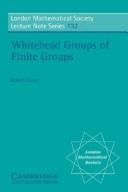
ISBN: 1139884263 1107366267 1107370981 1107361354 1107369320 1299404057 1107363802 0511600658 9781107361355 9780511600654 0521336465 9780521336468 Year: 1988 Publisher: Cambridge Cambridge University Press
Abstract | Keywords | Export | Availability | Bookmark
 Loading...
Loading...Choose an application
- Reference Manager
- EndNote
- RefWorks (Direct export to RefWorks)
This book's aim is to make accessible techniques for studying Whitehead groups of finite groups, as well as a variety of related topics such as induction theory and p-adic logarithms. The author has included a lengthy introduction to set the scene for non-specialists who want an overview of the field, its history and its applications. The rest of the book consists of three parts: general theory, group rings of p-groups and general finite groups. The book will be welcomed by specialists in K- and L-theory and by algebraists in general as a state-of-the art survey of the area.
Whitehead groups. --- Finite groups. --- Induction (Mathematics) --- Mathematical induction --- Induction (Logic) --- Mathematics --- Groups, Finite --- Group theory --- Modules (Algebra) --- Groups, Whitehead --- Abelian groups --- K-theory --- Rings (Algebra)
Book
ISBN: 9780511777110 9781107003637 9781139161381 1139161385 9781139159333 113915933X 0511777116 1283342448 9781283342445 9786613342447 6613342440 1107003636 9781139157568 1139160389 9781139160384 1139155814 9781139155816 1139157566 9781139157568 110722697X Year: 2012 Publisher: Cambridge, UK New York Cambridge University Press
Abstract | Keywords | Export | Availability | Bookmark
 Loading...
Loading...Choose an application
- Reference Manager
- EndNote
- RefWorks (Direct export to RefWorks)
"Induction is a pervasive tool in computer science and mathematics for defining objects and reasoning on them. Coinduction is the dual of induction and as such it brings in quite different tools. Today, it is widely used in computer science, but also in other fields, including artificial intelligence, cognitive science, mathematics, modal logics, philosophy and physics. The best known instance of coinduction is bisimulation, mainly employed to define and prove equalities among potentially infinite objects: processes, streams, non-well-founded sets, etc. This book presents bisimulation and coinduction: the fundamental concepts and techniques and the duality with induction. Each chapter contains exercises and selected solutions, enabling students to connect theory with practice. A special emphasis is placed on bisimulation as a behavioural equivalence for processes. Thus the book serves as an introduction to models for expressing processes (such as process calculi) and to the associated techniques of operational and algebraic analysis"--
Bisimulation. --- Coinduction (Mathematics) --- Modality (Logic) --- Induction (Mathematics) --- Computer science. --- Informatics --- Science --- Mathematical induction --- Induction (Logic) --- Mathematics --- Modal logic --- Logic --- Nonclassical mathematical logic --- Bisimulation --- Mathematical coinduction
Book
ISBN: 9781107004979 9780511792588 9781139159340 1139159348 1107004977 0511792581 9781139161398 1139161393 1107227232 1283342456 9786613342454 1139160397 1139155822 1139157574 Year: 2011 Publisher: Cambridge Cambridge University Press
Abstract | Keywords | Export | Availability | Bookmark
 Loading...
Loading...Choose an application
- Reference Manager
- EndNote
- RefWorks (Direct export to RefWorks)
"Coinduction is a method for specifying and reasoning about infinite data types and automata with infinite behaviour. In recent years, it has come to play an ever more important role in the theory of computing. It is studied in many disciplines, including process theory and concurrency, modal logic and automata theory. Typically, coinductive proofs demonstrate the equivalence of two objects by constructing a suitable bisimulation relation between them. This collection of surveys is aimed at both researchers and Master's students in computer science and mathematics and deals with various aspects of bisimulation and coinduction, with an emphasis on process theory. Seven chapters cover the following topics: history, algebra and coalgebra, algorithmics, logic, higher-order languages, enhancements of the bisimulation proof method, and probabilities. Exercises are also included to help the reader master new material"--
Bisimulation --- Coinduction (Mathematics) --- Modality (Logic) --- Induction (Mathematics) --- Computer science --- Co-induction (Mathématiques) --- Modalité (Logique) --- Induction (Mathématiques) --- Informatique --- Bisimulation. --- Computer science. --- Informatics --- Science --- Mathematical induction --- Induction (Logic) --- Mathematics --- Modal logic --- Logic --- Nonclassical mathematical logic --- Mathematical coinduction
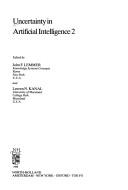
ISBN: 0444703969 1322472262 1483296539 9781483296531 9780444703965 Year: 1988 Volume: 5 Publisher: Amsterdam North-Holland
Abstract | Keywords | Export | Availability | Bookmark
 Loading...
Loading...Choose an application
- Reference Manager
- EndNote
- RefWorks (Direct export to RefWorks)
This second volume is arranged in four sections: Analysis contains papers which compare the attributes of various approaches to uncertainty. Tools provides sufficient information for the reader to implement uncertainty calculations. Papers in the Theory section explain various approaches to uncertainty. The Applications section describes the difficulties involved in, and the results produced by, incorporating uncertainty into actual systems.
681.3*E4 --- 681.3*I23 --- Coding and information theory: data compaction and compression; formal modelsof communication; nonsecret encoding schemes--See also {681.3*H11} --- Deduction and theorem proving: answer/reason extraction; reasoning; resolution; metatheory; mathematical induction; logic programming (Artificial intelligence) --- 681.3*I23 Deduction and theorem proving: answer/reason extraction; reasoning; resolution; metatheory; mathematical induction; logic programming (Artificial intelligence) --- 681.3*E4 Coding and information theory: data compaction and compression; formal modelsof communication; nonsecret encoding schemes--See also {681.3*H11} --- Artificial intelligence. --- Problem solving. --- Uncertainty (Information theory) --- Measure of uncertainty (Information theory) --- Shannon's measure of uncertainty --- System uncertainty --- Information measurement --- Probabilities --- Questions and answers --- Methodology --- Psychology --- Decision making --- Executive functions (Neuropsychology) --- AI (Artificial intelligence) --- Artificial thinking --- Electronic brains --- Intellectronics --- Intelligence, Artificial --- Intelligent machines --- Machine intelligence --- Thinking, Artificial --- Bionics --- Cognitive science --- Digital computer simulation --- Electronic data processing --- Logic machines --- Machine theory --- Self-organizing systems --- Simulation methods --- Fifth generation computers --- Neural computers --- Artificial intelligence --- Knowledge Representation --- Uncertainty
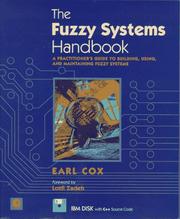
ISBN: 9780121942700 0121942708 Year: 1994 Publisher: Boston : AP Professional,
Abstract | Keywords | Export | Availability | Bookmark
 Loading...
Loading...Choose an application
- Reference Manager
- EndNote
- RefWorks (Direct export to RefWorks)
System Design --- Adaptive control systems --- Fuzzy systems --- System design --- regeltechniek --- automatisering --- fuzzy system --- set --- systemen --- 681.3*C0 --- 681.3*I23 --- 681.3*I51 --- fuzzy logic --- fuzzy systeem --- Systems, Fuzzy --- System analysis --- Fuzzy logic --- Self-adaptive control systems --- Artificial intelligence --- Feedback control systems --- Self-organizing systems --- Design, System --- Systems design --- Electronic data processing --- Computerwetenschap--?*C0 --- Deduction and theorem proving: answer/reason extraction; reasoning; resolution; metatheory; mathematical induction; logic programming (Artificial intelligence) --- Models: deterministic; fuzzy set; geometric; statistical; structural (Patternrecognition) --- (zie ook: vage logica) --- Contains audio-visual material --- Adaptive control systems. --- Fuzzy systems. --- System design. --- 681.3*I51 Models: deterministic; fuzzy set; geometric; statistical; structural (Patternrecognition) --- 681.3*I23 Deduction and theorem proving: answer/reason extraction; reasoning; resolution; metatheory; mathematical induction; logic programming (Artificial intelligence)
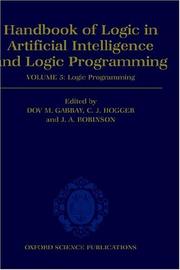
ISBN: 0191916676 1280375280 9786610375288 0191546283 0585483914 9780585483917 9781280375286 019853745X 9780198537458 0198537468 9780198537465 0198537476 9780198537472 0198537913 9780198537915 0198537921 9780198537922 Year: 1998 Publisher: Oxford Oxford New York Clarendon Press Oxford University Press
Abstract | Keywords | Export | Availability | Bookmark
 Loading...
Loading...Choose an application
- Reference Manager
- EndNote
- RefWorks (Direct export to RefWorks)
The Handbook of Logic in Artificial Intelligence and Logic Programming is a multi-volume work covering all major areas of the application of logic to artificial intelligence and logic programming. The authors are chosen on an international basis and are leaders in the fields covered. Volume 5 is the last in this well-regarded series. Logic is now widely recognized as one of the foundational disciplines of computing. It has found applications in virtually all aspects of the subject, from software and hardware engineering to programming languages and artificial intelligence.
Logic programming. --- Computer programming --- 681.3*I2 --- 681.3*I23 --- 681.3*I23 Deduction and theorem proving: answer/reason extraction; reasoning; resolution; metatheory; mathematical induction; logic programming (Artificial intelligence) --- Deduction and theorem proving: answer/reason extraction; reasoning; resolution; metatheory; mathematical induction; logic programming (Artificial intelligence) --- 681.3*I2 Artificial intelligence. AI --- Artificial intelligence. AI --- Logic programming --- Artificial intelligence --- Logic, Symbolic and mathematical --- Algebra of logic --- Logic, Universal --- Mathematical logic --- Symbolic and mathematical logic --- Symbolic logic --- Mathematics --- Algebra, Abstract --- Metamathematics --- Set theory --- Syllogism --- AI (Artificial intelligence) --- Artificial thinking --- Electronic brains --- Intellectronics --- Intelligence, Artificial --- Intelligent machines --- Machine intelligence --- Thinking, Artificial --- Bionics --- Cognitive science --- Digital computer simulation --- Electronic data processing --- Logic machines --- Machine theory --- Self-organizing systems --- Simulation methods --- Fifth generation computers --- Neural computers --- Knowledge, Theory of. --- Théorie de la connaissance. --- Informatique --- Computer science --- Logique mathématique --- Logique non monotone --- Nonmonotonic reasoning --- Artificial intelligence. --- Logic, Symbolic and mathematical. --- Théorie de la connaissance --- Computer science. --- Logique mathématique. --- Logique générale --- Epistemologie --- Logique modale --- Knowledge representation
Book
ISBN: 3642109314 3642109349 Year: 2011 Publisher: Berlin ; New York : Springer : Firenze : C.I.M.E. Foundation,
Abstract | Keywords | Export | Availability | Bookmark
 Loading...
Loading...Choose an application
- Reference Manager
- EndNote
- RefWorks (Direct export to RefWorks)
B.De Finetti: La probabilità e la statistica nei rapporti con l´induzione, secondo i diversi punti di vista.- L.J. Savage: La probabilità soggettiva nei problemi pratici della statistica.- L. Daboni: Sulle catene di Markoff.- S. Lombardini: Decisioni economiche in condizioni di incertezza.- A. Longo: La R.O. (Ricerca Operativa).
Induction (Mathematics) -- Congresses. --- Mathematical statistics. --- Mathematical statistics -- Congresses. --- Statistics -- Periodicals. --- Mathematics --- Physical Sciences & Mathematics --- Mathematical Statistics --- Probabilities --- Induction (Mathematics) --- Mathematical induction --- Statistics. --- Operations research. --- Management science. --- Statistics, general. --- Operations Research, Management Science. --- Induction (Logic) --- Statistical analysis --- Statistical data --- Statistical methods --- Statistical science --- Econometrics --- Statistics . --- Quantitative business analysis --- Management --- Problem solving --- Operations research --- Statistical decision --- Operational analysis --- Operational research --- Industrial engineering --- Management science --- Research --- System theory

ISBN: 0444816445 9786613272751 128327275X 0080539645 9780080539645 9780444816443 6613272752 Year: 1996 Volume: 13. Publisher: Amsterdam ; New York : Elsevier,
Abstract | Keywords | Export | Availability | Bookmark
 Loading...
Loading...Choose an application
- Reference Manager
- EndNote
- RefWorks (Direct export to RefWorks)
Logic's basic elements are unfolded in this book. The relation of and the transition from Logic to Logic Programming are analysed. With the use and the development of computers in the beginning of the 1950's, it soon became clear that computers could be used, not only for arithmetical computation, but also for symbolic computation. Hence, the first arithmetical computation programs, and the first programs created to answer elementary questions and prove simple theorems, were written simultaneously. The basic steps towards a general method based on Logic, were accomplished in 1965 by Robinson
Logic programming --- Logic, Symbolic and mathematical --- Programmation logique --- Logique symbolique et mathématique --- 681.3*D16 --- 681.3*F41 --- 681.3*I23 --- 681.3*I24 --- Computerwetenschap--?*D16 --- Mathematical logic: computability theory; computational logic; lambda calculus; logic programming; mechanical theorem proving; model theory; proof theory;recursive function theory--See also {681.3*F11}; {681.3*I22}; {681.3*I23} --- Deduction and theorem proving: answer/reason extraction; reasoning; resolution; metatheory; mathematical induction; logic programming (Artificial intelligence) --- Knowledge representation formalisms and methods: frames and scripts; predicate logic; relation systems; representation languages; procedural and rule-based representations; semantic networks (Artificial intelligence) --- 681.3*I24 Knowledge representation formalisms and methods: frames and scripts; predicate logic; relation systems; representation languages; procedural and rule-based representations; semantic networks (Artificial intelligence) --- 681.3*I23 Deduction and theorem proving: answer/reason extraction; reasoning; resolution; metatheory; mathematical induction; logic programming (Artificial intelligence) --- 681.3*F41 Mathematical logic: computability theory; computational logic; lambda calculus; logic programming; mechanical theorem proving; model theory; proof theory;recursive function theory--See also {681.3*F11}; {681.3*I22}; {681.3*I23} --- Algebra of logic --- Logic, Universal --- Mathematical logic --- Symbolic and mathematical logic --- Symbolic logic --- Mathematics --- Algebra, Abstract --- Metamathematics --- Set theory --- Syllogism --- Computer programming --- Logique symbolique et mathématique --- Logic programming. --- Logic, Symbolic and mathematical.
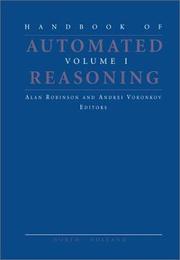
ISBN: 0444508139 0444829490 0444508120 0262182211 026218222X 0262182238 9786612284946 1282284940 0080532799 9780444508133 9780444829498 9780444508126 9780080532790 Year: 2001 Publisher: Amsterdam ; London : Elsevier,
Abstract | Keywords | Export | Availability | Bookmark
 Loading...
Loading...Choose an application
- Reference Manager
- EndNote
- RefWorks (Direct export to RefWorks)
Handbook of Automated Reasoning
Qualitative reasoning --- Automatic theorem proving --- Raisonnement qualitatif --- Théorèmes --- Démonstration automatique --- 681.3*D24 --- 681.3*F4 --- 681.3*I22 --- 681.3*I23 --- Program verification: assertion checkers; correctness proofs; reliability; validation (Software engineering)--See also {681.3*F31} --- Mathematical logic and formal languages (Theory of computation) --- Automatic programming: automatic analysis of algorithms; program modification; program synthesis; program transformation; program verification (Artificialintelligence)--See also {681.3*D12}; {681.3*F31} --- Deduction and theorem proving: answer/reason extraction; reasoning; resolution; metatheory; mathematical induction; logic programming (Artificial intelligence) --- Automatic theorem proving. --- Qualitative reasoning. --- 681.3*I23 Deduction and theorem proving: answer/reason extraction; reasoning; resolution; metatheory; mathematical induction; logic programming (Artificial intelligence) --- 681.3*I22 Automatic programming: automatic analysis of algorithms; program modification; program synthesis; program transformation; program verification (Artificialintelligence)--See also {681.3*D12}; {681.3*F31} --- 681.3*F4 Mathematical logic and formal languages (Theory of computation) --- 681.3*D24 Program verification: assertion checkers; correctness proofs; reliability; validation (Software engineering)--See also {681.3*F31} --- Théorèmes --- Démonstration automatique --- Information Technology --- General and Others --- Artificial intelligence. --- AI (Artificial intelligence) --- Artificial thinking --- Electronic brains --- Intellectronics --- Intelligence, Artificial --- Intelligent machines --- Machine intelligence --- Thinking, Artificial --- Bionics --- Cognitive science --- Digital computer simulation --- Electronic data processing --- Logic machines --- Machine theory --- Self-organizing systems --- Simulation methods --- Fifth generation computers --- Neural computers --- Artificial intelligence --- Reasoning
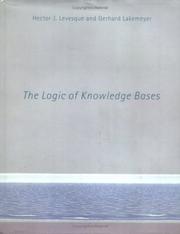
ISBN: 0262122324 0262278235 1423726472 9780262278232 9780262122320 Year: 2000 Publisher: Cambridge, Mass. MIT Press
Abstract | Keywords | Export | Availability | Bookmark
 Loading...
Loading...Choose an application
- Reference Manager
- EndNote
- RefWorks (Direct export to RefWorks)
The idea of knowledge bases lies at the heart of symbolic, or "traditional," artificial intelligence. A knowledge-based system decides how to act by running formal reasoning procedures over a body of explicitly represented knowledge--a knowledge base. The system is not programmed for specific tasks; rather, it is told what it needs to know and expected to infer the rest.This book is about the logic of such knowledge bases. It describes in detail the relationship between symbolic representations of knowledge and abstract states of knowledge, exploring along the way the foundations of knowledge, knowledge bases, knowledge-based systems, and knowledge representation and reasoning. Assuming some familiarity with first-order predicate logic, the book offers a new mathematical model of knowledge that is general and expressive yet more workable in practice than previous models. The book presents a style of semantic argument and formal analysis that would be cumbersome or completely impractical with other approaches. It also shows how to treat a knowledge base as an abstract data type, completely specified in an abstract way by the knowledge-level operations defined over it.
Théorie de la connaissance --- Logique mathématique --- Information, Théorie de l' --- Knowledge representation (Information theory) --- Expert systems (Computer science) --- Logic, Symbolic and mathematical. --- Logic, Symbolic and mathematical --- 681.3*I23 --- 681.3*I24 --- Algebra of logic --- Logic, Universal --- Mathematical logic --- Symbolic and mathematical logic --- Symbolic logic --- Mathematics --- Algebra, Abstract --- Metamathematics --- Set theory --- Syllogism --- Representation of knowledge (Information theory) --- Artificial intelligence --- Information theory --- Knowledge-based systems (Computer science) --- Systems, Expert (Computer science) --- Computer systems --- Soft computing --- Deduction and theorem proving: answer/reason extraction; reasoning; resolution; metatheory; mathematical induction; logic programming (Artificial intelligence) --- Knowledge representation formalisms and methods: frames and scripts; predicate logic; relation systems; representation languages; procedural and rule-based representations; semantic networks (Artificial intelligence) --- Computer Science --- Engineering & Applied Sciences --- 681.3*I24 Knowledge representation formalisms and methods: frames and scripts; predicate logic; relation systems; representation languages; procedural and rule-based representations; semantic networks (Artificial intelligence) --- 681.3*I23 Deduction and theorem proving: answer/reason extraction; reasoning; resolution; metatheory; mathematical induction; logic programming (Artificial intelligence) --- Expert systems (Computer science). --- Knowledge representation (Information theory). --- Théorie de la connaissance. --- Logique mathématique. --- Information, Théorie de l'. --- COMPUTER SCIENCE/Artificial Intelligence --- Théorie de la connaissance. --- Logique mathématique. --- Information, Théorie de l'.
| Listing 1 - 10 of 39 | << page >> |
Sort by
|

 Search
Search Feedback
Feedback About UniCat
About UniCat  Help
Help News
News